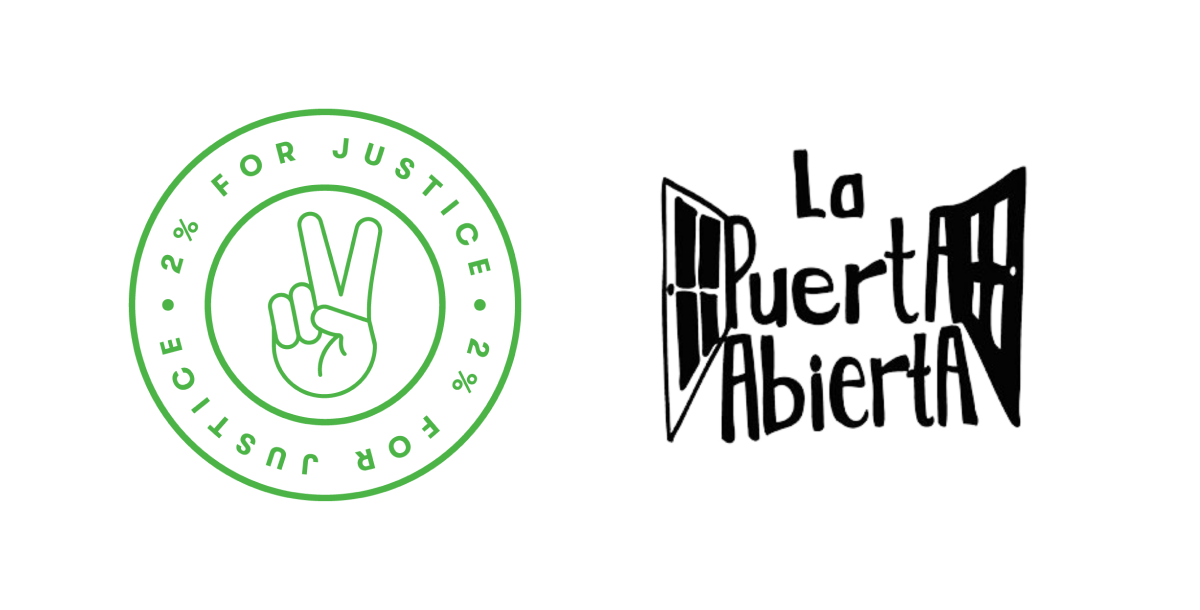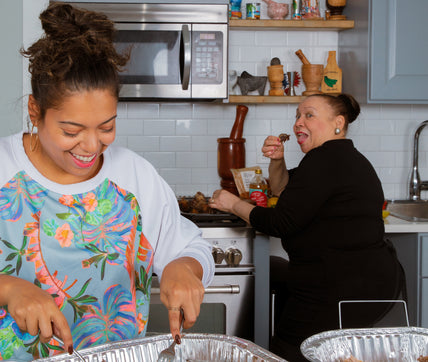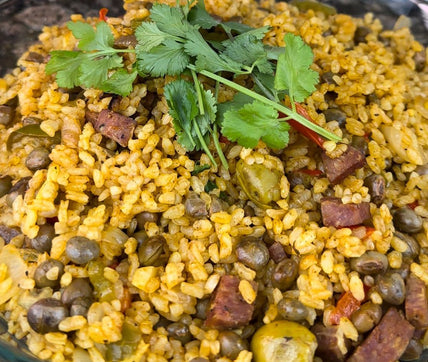
2% for La Puerta Abierta
Our December commitment will go to La Puerta Abierta, a provider of pro bono mental health services to the Latino immigrant and refugee community of Philadelphia!
For our next 2% for Justice commitment, we are proud to announce our donation to La Puerta Abierta, a provider of pro bono comprehensive, trauma-informed mental health services – including individual, family, and group therapy – to the Latino immigrant and refugee community in the five-county Philadelphia region.

We were introduced through a friend in our network specifically to the work of La Puerta Abierta's special program called Compas de Viaje, which organizes and maintains peer mentorship networks, counseling sessions and events for immigrant youth. Our conversation with Programming Coordinator Tamara Jimenez, herself an immigrant, was both beautiful and powerful. Her program's efforts are not only valuable, they are necessary, and we're proud to share more of her words with you below.

How did the Compas de Viaje program start?
Being undocumented has become a statistic. It erases the humanity of people. The program was born because of this.
I started volunteering because of my own experiences - because of how I was feeling as a young immigrant. We put the word out about a youth program to confront this and got many referrals back, and many were unaccompanied minors in a particularly difficult situation being new to this community. So we decided to gather those interested together. We had an open house - a casa abierta. We invited newcomers, put food on the table, gathered around the table, and started talking about what they we going through. They showed interest, they needed a space to talk about who they were, and the way they were feeling being in the US. From that moment Compas de Viaje were born.
Tell us more about the group's meetings, what takes place? How has the program evolved?
We started with 6-7 youth in our program. Every weekend, we'd come together to talk about their lives, cook together, make art together. even dance. To me, the simplicity of it, is that the youth are so isolated, and we wanted to give them a space to be validated, to feel seen.
Around the same time, this is about 5 years ago, local schools started calling us, even teachers, because they had this new population and did not know what to do with it. A lot of the youth didn't have families here either, or were living with other caregivers. We decided - why don't we have a group in one of the schools?
We started our first high school group over 4 years ago. We ran it in Spanish for newly arrived youth immigrants - those fleeing, violence, gang violence, interpersonal violence. We'd have groups during school hours, and continuing what we'd learned before the schools, we partnered with an amazing Salvadorian artist to create an agenda around art, therapeutic art. The youth would come and we'd always have food, part of it was very social, and they'd come and eat and talk about family, and express through art. We'd discuss their family back home, here, or even the lack of family, and what that means to them. We'd discuss relationships, talk about immigration, really any ways we could find for them to express themselves. And from that, more schools started reaching out to us. We are such a small organization, so we started and expanded to 2 schools, and now we're up to 4.
What motivated the decision to expand programming in schools, and even to have events during school hours?
For one, we do the sessions in Spanish, and school usually is not. The surrounding experience is not one where have the space to express themselves. They are in a cultural setting where everything is about the academic path. But sometimes, which we know, their heads and their minds are somewhere else. They are thinking about their next immigration court hearing. Their families. That they need a job. Their responsibilities. This is meant to be a space to unwind and let go of all the things they carry.
Once the school year ended, they'd ask, how do we keep continuing? So we started summer programming. We now run a 6 week summer program each year, and I'm thank to have many friends who help.
What's a project the groups have done that you can share about in more detail?
For our program in 2019, the theme was built around paper mache, which we did with artist Mauricio Perez. We invited him to collaborate based on this idea, and started by imagining what this could look like. We decided to have their art represent their journeys, their lives, their identities, which we'd do by having the youth create masks. So each of the group was tasked with designing a mask that represented their past, present, and future, to show the narration of their lives.

Mauricio taught us how to use every element of the process - from creating the paper mache, to the glue - and we'd use those lessons to have conversations about their lives, trying to focus on the happy moments. Still, there were some masks that were heavy on traumatic experiences. One youth from El Salvador, we would talk about his journey, and his life was all about violence and death. So we thought, let's talk about that. It's not going to disappear from his life. But let's put it in context so this youth could talk about it in a way that wasn't too heavy. His mask was a devil mask, but in the back of it was a Bible passage. In the process, he decided this wasn't something he wanted to live with because that was his past. Those experiences, they were his only vision of himself, and our role really is to help him to see himself beyond that. To see this as a new opportunity. Because without that, it was as if his past was following him. Many of the neighborhoods they move to here, there is no escape. The evil and the good of his mask was a representation, that he was more than just the outside.


This was a 6-week process, and at the end, we had gallery exhibit. The youth spoke to the whole group about the process and why they chose the elements that were part of their mask.
How do you view the unique value programs like Compas de Viaje provide for the youth community?
When it comes to therapy, for a lot of youth, conventional therapy can work. But because of the model that exists when it comes to conventional therapy, it does not always fit for youth, and it does not always fit for the Latinx community. They don't talk about immigration, crossing the border, inter-generational trauma - all that we include. A lot of the youth are connected to conventional therapy through La Puerta Abierta, yet with Compas de Viaje, there is a therapeutic space, to little by little feel more relaxed, and have a place of belonging. The best part of all this is creating relationships. At the end of the day they get to know each other, they share experiences, they feel more of a community.

Please join us in supporting La Puerta Abierta and volunteers like Tamara as they continue their incredible efforts across the Philadelphia region by...





